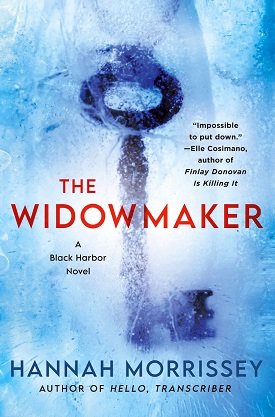I’m thrilled to share an excerpt from Nicci French’s forthcoming DARK SATURDAY, on sale July 11th! This psychological suspense novel delves into the case of a young woman who was imprisoned for brutally murdering her family 10 years prior. When psychotherapist Frieda Klein is tasked with assessing the young woman, she discovers a case that’s far more complex than she could have imagined.
I’m currently reading DARK SATURDAY, and I’m enjoying it so far! This is part of a series, but I’m trying my hand at reading it as a standalone - I will of course keep you posted on how it goes. Husband and writing team Nicci French writes with a style that’s quite distinctive: it’s rich with detail (as you’ll see in the excerpt below), and draws the reader into a detailed portrayal of the case at hand.
Read on for a full plot summary, more information about the authors, and an excerpt of DARK SATURDAY provided by the publisher!
DARK SATURDAY - BOOK DETAILS
A decade ago, 18-year-old Hannah Docherty was arrested for the shocking murder of her family. It was an open-and-shut case, and Hannah has been incarcerated in a secure psychiatric hospital ever since.
When psychotherapist Frieda Klein is asked to meet Hannah and give her assessment, she reluctantly agrees. But what she finds horrifies her. Hannah has become a tragic figure, old before her time. And Frieda is haunted by the idea that Hannah might be as much of a victim as her family — that she might, in fact, be innocent.
As Hannah's case takes hold of her, Frieda begins to realize that she's up against someone who will go to any lengths to keep the truth from surfacing — even kill again.
Utterly compelling and enthralling, Dark Saturday speeds readers down a twisting trail of secrets, suspense, and murder.
About Nicci French:
Nicci French is the pseudonym of English wife-and-husband team Nicci Gerrard and Sean French. Their acclaimed novels of psychological suspense have sold more than 8 million copies around the world.
Excerpt: DARK SATURDAY by Nicci French
William Morrow; 7/11/17
Chelsworth Hospital was not a prison. Its inmates were patients and the doctors’ job was to treat them and make them better. But as Frieda stepped through a series of reinforced doors, which clanged behind her, into a security capsule, where she was patted down and had to turn out her pockets, then walked along a blank narrow corridor in the wake of two bulky men, who had keys jangling on their belts, past gridded windows that looked out onto a tangle of barbed-wire fencing, it felt like all the other high-security prisons she’d been to over the course of her career. Its name marked it out, sending a special shiver of recognition through people when they heard it. A house of unquiet spirits.
They reached the back of the hospital, and another set of double doors was unlocked to take them out into a large area surrounded by a high, spiked wall. In the far corner, Frieda saw there was a greenhouse and she could make out shadowy figures inside, stooping as they worked. A man ambled past them, huge, smiling. His head was shaved and Frieda saw he had a livid scar running across his skull.
“The women’s unit,” one of the nurses said, nodding toward a wing of the building that formed part of the courtyard.
“How many women are there here?”
“Oh, not so many. Maybe twenty-five, thirty.” He sidestepped another patient coming toward him, a nurse a few steps behind him. “Half of them have murdered their kids. Sometimes at night you can’t sleep for their screaming.”
“You wouldn’t believe what some of them have done,” said the other nurse. He spoke with a kind of gloomy relish.
“We’re meant to think of them as ill, not bad, but it makes you wonder.”
Frieda sat in a small room and waited. It was very hot, very quiet. Someone screamed in the rooms above her, but the scream died away. The old radiator in the corner gurgled. The door opened and a burly man in scrubs entered. He nodded at Frieda, then turned.
“Come on, Hannah,” he said. “This is the doctor lady I was telling you about.”
Frieda stood up. Hannah Docherty came into the room.
Hannah Docherty: Frieda tried to put out of her mind everything she knew, or half knew or had overheard or glimpsed in newspaper headlines. She tried not to remember the photos she had seen all those years ago, and which still cropped up whenever a woman behaved in a way that no woman was ever supposed to behave, did something “unnatural.” She tried simply to concentrate on the figure in front of her, as she limped into the room with an awkward, heavy-footed gait.
The first thing that struck Frieda was her size. Even stooped as she was and draped in thick layers of clothing, Hannah Docherty was obviously tall and solid, with broad shoulders and large, almost mannish hands. At first it was impossible to see her face, because it was obscured by a coarse mane of thick, dark hair, with a single violent streak of white running down from the parting. Then Frieda saw that she was wearing handcuffs.
She lifted her head and Frieda saw her face: bruised, swollen, her full lip cut into a sneer and thick brows drawn down. Frieda met her eyes: almost black, but very bright, they seemed to glow at her out of the discolored face, as if she were backlit. Frieda tried to make out Hannah’s expression: was she scared, confused, sullen, angry? Perhaps she was all of these. Her dilated pupils and the slight drag of her mouth also indicated that she had been drugged. She raised her cuffed hands to her face and Frieda saw a swirl of tattoos, homemade, amateurish. They were on the backs of her hands, her lower arms, around her neck, like ink drawings on soft paper that had spread and become blurred and fuzzy.
“Hannah,” she said. “I’m Frieda.”
Hannah stared at her but didn’t move. Frieda took a few paces toward her and the woman flinched and stiffened; the nurse took hold of her arm.
“You want to be careful of her,” he said to Frieda. “She can just go for people. She’s even stronger than she looks.”
“Don’t talk about Hannah as if she wasn’t here. Please, take off her handcuffs.”
“She’s just stabbed someone. Nearly killed them.”
“I’m assuming she doesn’t have a knife on her now.”
“You never know.” He gave a low laugh.
“Take them off.”
He shrugged, then, removing the keys from his belt, unlocked the cuffs. Frieda saw red weals round Hannah’s wrists. She drew out a chair and put it close to the woman. “Here, sit down. You look like you’ve hurt your leg. I just want to talk to you.”
“She’s not much of a talker,” said the nurse.
Frieda stared at him. “I’d like to be alone with Hannah.”
The man looked doubtful.
“You can wait just outside.”
He looked from Frieda to Hannah. Then, muttering under his breath, he went out. Frieda shut the door and put her chair opposite Hannah’s, but not too close. Hannah had wrapped her arms around herself and lowered her head once more, so that her hair hid her face. She rocked slightly, making tiny guttural noises.
“Do you understand what I’m saying?”
No reply. She went on rocking.
“I’ve come to talk to you and find out what you think about things that concern you.”
Nothing.
“I know you’ve been in here a long time. Perhaps it’s hard to remember what happened before you were here. Do you remember?”
Hannah went on rocking, moaning.
“You might have things to say, things you couldn’t say at the time about the way you were treated. You can talk to me, Hannah.”
Suddenly the woman sat up straighter. “It’s me,” she said, in a deep voice that sounded hoarse from disuse, almost rusty.
“It’s me it’s me it’s me.”
“What is?”
“It’s me.”
“Hannah, can you remember when your family died?”
“Me.” She lifted a hand and smashed it into the top of her head. “Me.” Once more she struck herself.
“Don’t hurt yourself,” said Frieda, resisting the impulse to take Hannah’s large hand in her own to restrain her. “Don’t do that. Look at me.”
“No. No. Don’t.” Then she said suddenly, in a voice that was quite calm and clear, “I’m too hot.”
It was true: it was almost unbearably stuffy in the room and beads of sweat were running down Hannah’s face. She pulled off her gray cardigan. Under it was another long-sleeved top that she grappled with, tugging its sleeves up her arms and trapping herself in its folds, fighting. Frieda could hear her heavy breathing.
“Shall I help?” asked Frieda. She rose, took the hem of the jumper, pulled it swiftly over Hannah’s head, then sat down again. Hannah blinked at her. She was only wearing a dark blue undershirt now, stained under the armpits. Her bare flesh was covered with tattoos, hardly any skin left unmarked by circles and geometric patterns, words and images, so that it was hard to know which to look at: the serpent, the rose, the crucifix, the swirling lines, the bird, the numbers and roman numerals, the web . . . She was like a violent manuscript in many colors.
“Your tattoos are amazing,” said Frieda. “Have they all been done here?”
Hannah didn’t reply, but she let her hands rest on her lap and was no longer rocking.
“What does that one mean?” asked Frieda, stretching out a hand but not quite touching what looked like an hourglass, or perhaps it was a crude drawing of a naked woman, surrounded by small oval shapes, perhaps raindrops or tears.
Hannah didn’t speak; her black eyes burned.
“Do you have a favorite?”
There was no answer, but after a few moments, Hannah put a finger on the inside of her forearm where there were three tiny inked shapes that looked like wonky crosses with circles on top. She touched the middle one and made a noise.
“What is it?” asked Frieda. “What does it mean?”
Hannah made another stifled sound. Frieda leaned forward, intent. Hannah touched the shapes softly again. Her breath came in little rasps.
“What is it?” asked Frieda. “Hannah?”
“Me me me me,” she said. “Me.”
She wrapped her arms around herself once more and her hair came down, like a curtain, between them. She rocked to and fro.
When Frieda left the room, she asked the nurse waiting outside how often Hannah was visited.
He looked at her as though she had cracked a joke. “Her?”
“Yes. When did someone last come to see her?”
“I don’t know. Before my time.”
“How long have you been here?”
“About seven years.”
“You’re saying no one has visited her in seven years.”
“That’s right. Or more.”
“Does she have no relatives?”
“Why would any relative want to see her?”
“So there’s no one at all.”
“Why would there be?”
Grab your copy of DARK SATURDAY!
Series: A Frieda Klein Novel (Book 6)
Paperback: 400 pages
Publisher: William Morrow Paperbacks (July 11, 2017)
Language: English
ISBN-10: 0062676660
ISBN-13: 978-0062676665
Find DARK SATURDAY on Amazon.
No part of the above excerpt may be reproduced without permission of the publisher. I received a free copy of this book from the publisher in exchange for an honest review. This does not affect my opinion of the book or the content of my review. All opinions my own.













Home ownership feel like a distant dream? Zillow listings have you convinced you’ll be renting for the rest of your life? The woman at the heart of Carissa Orlando’s debut The September House feels your pain—and she’s prepared to put up with a lot if it means she and her husband can finally have a place to call their own. In this case, that might just mean living in a house that’s haunted. Playful and irreverent, spine-tingling and spooky, The September House puts a fresh spin on the classic haunted house story, delivering an immersive tale about the secrets lurking within one building’s walls, and within the lives of its inhabitants.